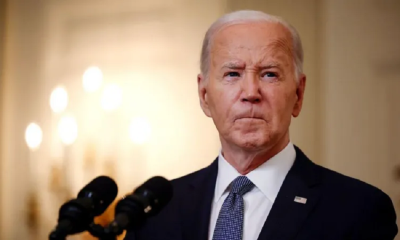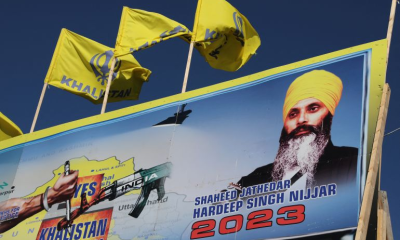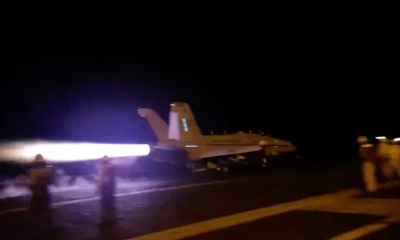Foreign News
Biden and Modi pledge to deepen ties in talks ahead of G20 summit

US President Joe Biden and Indian Prime Minister Narendra Modi have pledged to deepen ties between their two countries, as the leaders held direct talks ahead of a Group of 20 summit in New Delhi at the weekend.
In a joint statement on Friday, shortly after Biden landed in the Indian capital, the US and India reaffirmed their support for “a free, open, inclusive, and resilient Indo-Pacific” as members of the Quad alliance, which also includes Australia and Japan.
The talks marked the second in-person meeting between Biden and Modi since June, when the Indian leader made an official state visit to the White House as part of the countries’ push to bolster their alliance in the face of China’s growing influence.
“Many say that right now, it’s really a kind of golden age when it comes to the ties between the US and India. Things have almost never been better,” Al Jazeera’s Katrina Yu reported from New Delhi on Friday ahead of the Biden-Modi meeting.
“Undoubtedly, what’s bringing these two sides together is their bonding over their shared concern over China’s rising influence in the region,” she said.
The US is hoping to boost India “as a possible counterweight” to China, Yu said, as Washington views Beijing as its top global competitor and ties between the pair have been tested in recent years over a number of issues.
For his part, Modi is hoping “to project India as an alternative leader of the Global South, a title really that Beijing – arguably – currently holds”, Yu added.
India late last month lodged an objection through diplomatic channels with Beijing over China’s new standard map that lays claim to India’s territory along their shared border.
The map was released just days after Modi and Chinese President Xi Jinping met on the sidelines of a summit of the BRICS bloc of developing economies — Brazil, Russia, India, China and South Africa — and agreed to work to de-escalate tensions at their disputed border.
On Friday, Modi and Biden also discussed a number of deals that were reached during their June talks in Washington, DC.
Biden welcomed a deal to allow General Electric to produce jet engines in India to power Indian military aircraft, according to the joint statement, as well as an agreement for India to purchase US drones.
Biden and Modi also “re-emphasized the shared values of freedom, democracy, human rights, inclusion, pluralism, and equal opportunities for all citizens are critical to the success our countries enjoy and that these values strengthen our relationship”, the statement said.
But the Biden administration has faced criticism from rights advocates who say it is ignoring the Modi government’s targeting of minorities, as well as an erosion of democracy and human rights in India.
For the fourth straight year, an independent US commission in May recommended adding the Indian government to a religious freedom blacklist, saying that conditions for religious minorities in the country “continued to worsen” throughout 2022.
India has rejected previous reports by the panel and accused senior US officials of making “ill-informed” and “biased” comments.
Speaking to reporters on Thursday, White House National Security Adviser Jake Sullivan said the Biden-Modi talks would be a follow-up to the discussions they had in June.
“Of course, President Biden will also speak on critical, fundamental values that the United States stands for, as he does in all of his engagements,” he added.
Sullivan as well as US Secretary of Treasurey Janet Yellen joined the Biden-Modi meeting on Friday, the White House said in an earlier statement. Indian government attendees included External Affairs Minister Subrahmanyam Jaishankar and security adviser Ajit Doval.
Biden is also hoping that his presence at the G20 summit on Saturday and Sunday will demonstrate that the US and its like-minded allies are better economic and security partners than China.
White House officials said the US president will use the gathering as an opportunity for Washington to highlight a proposition for developing and middle-income countries that would increase the lending power of the World Bank and International Monetary Fund by some $200bn.
That is an attempt to offer a significant, albeit smaller, alternative to China’s massive Belt and Road infrastructure initiative.
China, which is also a member of the G20, has said that Xi will not attend the G20 summit and is instead dispatching Premier Li Qiang to represent the country.
Xi’s absence “affords the Biden administration even more of a chance to go on the offensive in terms of stepping up and showing what their value proposition is to the Global South”, Colleen Cottle, deputy director at the Atlantic Council’s Global China Hub, told The Associated Press news agency.
(Aljazeera)
Foreign News
‘Notorious Tanzanian drug trafficker’ arrested during raid in Zambia
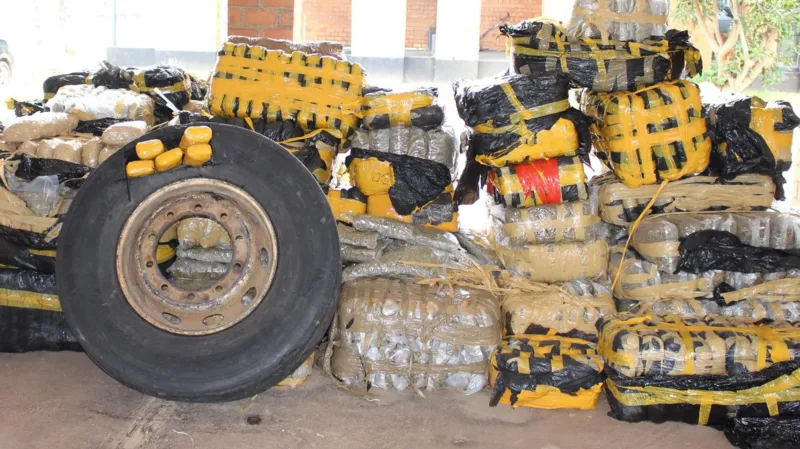
A “notorious” Tanzanian drug-trafficking kingpin has been arrested in Zambia during a raid, the Zambian Drug Enforcement Commission (DEC) has announced.
Ahmed Muharram was among several suspects detained in Zambia’s capital, Lusaka, along with large quantities of marijuana and cough syrup containing codeine in several drug busts on Tuesday, the authorities said.
“The suspect is a known transnational drug trafficker,” the DEC said, adding that the 40-year-old had long been on the anti-drug agency’s watch-list.
The arrest of Muharram, who has not yet commented, was made possible thanks to a series of intelligence-led operations, the agency said.
Under Zambian law, marijuana is classed as a dangerous drug and is illegal to possess.
The trafficking, possession and use of illegal drugs such as cannabis is punishable by a fine or a prison sentence.
The southern Africa country struggles with drug abuse and trafficking, especially cannabis and heroin.
During Tuesday’s operations, the DEC said it had seized 221.2kg of cannabis hidden in a lorry in Lusaka’s Lilayi area.
The search was extended to Muharram’s residence in Lilayi, where officers discovered an additional 1,159.6kg of “high-grade” cannabis, bringing the total seizure to 1,380.8kg, the agency added.
A Zambian national who was also arrested is believed to be an accomplice in the organised drug-trafficking scheme.
The DEC said their operations also saw the arrests of:
- A Zambian national for trafficking 55 boxes of Benylin containing codeine in Lusaka
- Two other Zambians for trafficking cannabis concealed in their vehicle
- Two Burundian nationals in the southern district of Chirundu for trafficking cannabis in separate vehicles: some was hidden inside a spare lorry tyre, some in gas compressors and additional cannabis was mixed with sugar, salt and paint and concealed in tins and buckets of paint.
“All suspects have since been detained in lawful custody and will appear in court soon,” DEC said in a statement.
The agency said it was committed to ensuring that Zambia was neither used as a corridor nor a destination for drug trafficking.
[BBC]
Foreign News
Fearing Russia will seize her town, war widow moves husband’s grave to Kyiv

The quiet of a Kyiv cemetery is broken by a trumpet salute, then a burst of rifle fire.
Soldiers stretch a Ukrainian flag over a shiny wooden coffin and stand silently alongside in the sparkling white snow. A woman cries, her face crumpling.
Natalia is burying her husband for the second time.
Vitaly was killed three years ago fighting in the eastern Donbas and his first grave was in their home town of Slovyansk. But Russian forces have advanced since then and the area is increasingly under attack.
So Natalia had her husband’s grave exhumed and Vitaly’s remains moved hundreds of miles to Ukraine’s capital.
“When we buried him in Slovyansk, land was being liberated and we thought the war would soon end,” Natalia explains, after the reburial ceremony conducted with military honours. “But the frontline is constantly moving closer and I was scared Vitaly might end up under occupation.”
Vitaly was a ceramics artist who volunteered to defend his country in the early days of Russia’s full-scale invasion in 2022.
“He didn’t want to, but he had do it. He was a patriot,” Natalia explains, through her tears. She was pregnant when her husband was killed and he never got to meet their daughter.
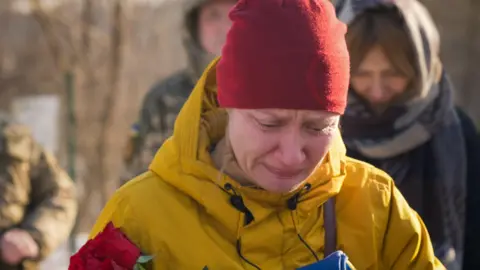
The decision to move Vitaly’s body from the land where he was born and fought was extremely painful.
“It was very hard, emotionally. But it was the right decision,” Natalia is sure. “It would have been far harder to leave him, to know that he had stayed.”
Ukrainians are facing unimaginable choices now as the US tries to broker a peace deal between Moscow and Kyiv, but Russia pushes on with its invasion.
That includes massive aerial attacks against Ukraine’s energy system, against all rules of war.
Meanwhile, the most pressure for compromise is on Kyiv.
At some point, the US-led talks will hone in on the most sensitive issue of all: the status of land in the eastern Donbas region that so many men have died defending.
Ukraine still controls around a fifth of the area, including Slovyansk. But the town is close to the current frontline where Russian forces have been trying to push forward for months.
Kyiv proposes freezing the fighting there, ceding nothing more. But Moscow wants to be handed control over the rest of the region and the US is thought to agree.
That is far from Vladimir Putin’s original plan to take over all Ukraine – to “denazify” and “demilitarise” as he snarled at the time. But it would allow him to claim a victory for Russia of sorts.
“There are drones in the streets, hitting minibuses, and glide bombs fall in the city centre, leaving craters,” Natalia says, describing life in Slovyansk now, where her husband had been buried.
“A few months ago, the attacks were weekly. Now it’s every couple of days.”
North of Natalia’s hometown, up around the city of Kharkiv, there are more signs that the danger zone is spreading.
Workmen hammer stakes into the frozen ground to fit nets which they’ll then stretch over the road in a canopy as protection against Russian drones.
Not far away, in an unmarked spot, we visited a workshop for Ukraine’s own UAVs.
The soldiers of the Typhoon unit work in a basement filled with heaps of kit and cables, reached via a handmade wooden staircase. The men are responsible for repairing drones damaged at the frontline and for innovation: Ukraine needs every chance against an enemy with more men and more resources.

The music playing as the team work is chirpy French pop, but the soldiers’ mood is mixed.
“We try not to discuss it here,” 29-year old Roman replies, when I ask about giving up territory in return for peace. “People quarrel and we don’t need that right now. We need to unite, and fight the Russians.”
Roman lost “a lot of guys”, he says, during his two years in the infantry, fighting in the Donbas.
No surprise that it’s far harder to recruit these days. Last month the country’s defence minister revealed that a staggering 200,000 soldiers were absent without leave.
But like many Ukrainians, Roman is sure that gifting the Donbas to Putin would not make Ukraine secure.
“The Russians will only come back for more,” he says.
Hunched over a laptop in the back room, another soldier admits that “victory” in this war looks very different these days.
“I would say our victory is in preserving our statehood,” Maksym argues, choosing his words carefully. “Even if we have three square kilometres of land, but we keep our constitution and our institutions, then this is still Ukraine.”
He thinks the soldiers should fight on, regardless.
“Russia is 10 times our size. But still we can’t surrender.”
Back in Kyiv, Natalia clings to the arm of a friend, as grave diggers shovel fresh earth onto her husband’s coffin then slot a wooden cross into place on top.
A photograph of Vitaly shows him smiling, posing beside a yellow sunflower.
Natalia is relieved to have her husband close again where she and their daughter, Vitalina, can visit his grave safely.
“She watches videos of him, looks at photos and she loves him very much even though they never met,” Natalia smiles.
She also hopes to tell her husband soon that she’s pregnant using the sperm the couple had frozen specially at a clinic, just a few days before Vitaliy was killed.
Many soldiers now do the same before heading for the front.
It’s a brutal fact, but Natalia says none of Vitaliy’s soldier friends made it to his reburial, because so many of them, too, are now dead.
Ukraine has paid an immense price already for four years of all-out war.
Ceding land to Russia that it already controls is one thing: an option now quietly accepted by many.
But Natalia can’t bear the thought of Russia taking more territory, including the town where she and Vitaly lived and were in love.
She has “no doubt” her husband would have wanted the army to fight on, not concede now.
“Russia may pause for a year, then there will be another breakthrough and they’ll be in Kharkiv,” Natalia says.
“I just don’t believe Russia will stop.”
[BBC]
Foreign News
China executes four more Myanmar mafia members
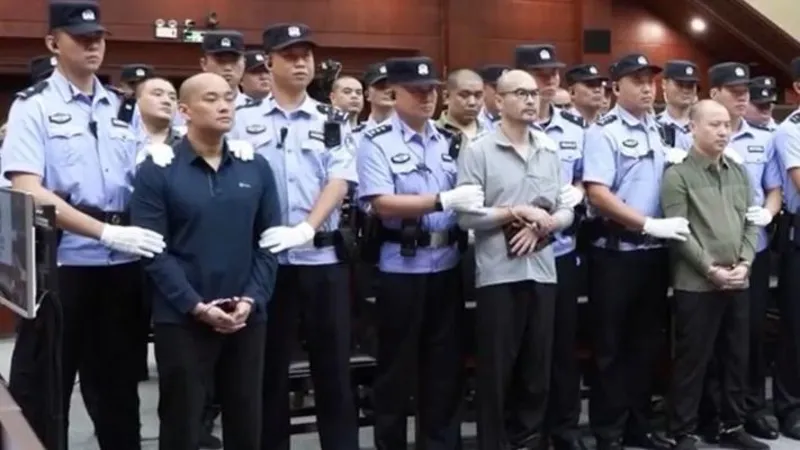
China has executed four members of the Bai family mafia, one of the notorious dynasties that ran scam centres in Myanmar, state media report.
They were among 21 of the family’s members and associates who were convicted of fraud, homicide, injury and other crimes by a court in Guangdong province.
Last November the court sentenced five of them to death including the clan’s patriarch Bai Suocheng, who died of illness after his conviction, state media reported.
Last week, China executed 11 members of the Ming family mafia as part of its crackdown on scam operations in South East Asia that have entrapped thousands of Chinese victims.
For years, the Bais, Mings and several other families dominated Myanmar’s border town of Laukkaing, where they ran casinos, red-light districts and cyberscam operations.
Among the clans, the Bais were “number one”, Bai Suocheng’s son previously told state media after he was detained.
The Bais, who controlled their own militia, established 41 compounds to house cyberscam activities and casinos, authorities said. Within the walls of those compounds was a culture of violence, where beatings and torture were routine.
The Bai family’s criminal activities led to the deaths of six Chinese citizens, the suicide of one person and multiple injuries, the court said.
The Bais rose to power in Laukkaing in the early 2000s after the town’s then warlord was ousted in a military operation led by Min Aung Hlaing – who now leads Myanmar’s military government.
The military leader had been looking for co-operative allies, and Bai Suocheng – then a deputy of the warlord – fitted the bill.
But the families’ empires crashed in 2023, when Beijing became frustrated by the Myanmar military’s inaction on the scam operations and tacitly backed an offensive by ethnic insurgents in the area, which marked a turning point in Myanmar’s civil war.
That led to the capture of the scam mafias and their members were handed to Beijing.
In China, they became subjects of state documentaries which emphasised Chinese authorities’ resolve to eradicate the scam networks.
With these recent executions Beijing appears to be sending a message of deterrence to would-be scammers.
Hundreds of thousands of people have been trafficked to run online scams in Myanmar and elsewhere in South East Asia, according to estimates by the United Nations.
Among them are thousands of Chinese people, and their victims who they swindle billions of dollars from are mainly Chinese as well.
(BBC)
-

 Opinion6 days ago
Opinion6 days agoSri Lanka, the Stars,and statesmen
-

 Business5 days ago
Business5 days agoHayleys Mobility ushering in a new era of premium sustainable mobility
-

 Business2 days ago
Business2 days agoSLIM-Kantar People’s Awards 2026 to recognise Sri Lanka’s most trusted brands and personalities
-

 Business5 days ago
Business5 days agoAdvice Lab unveils new 13,000+ sqft office, marking major expansion in financial services BPO to Australia
-

 Business5 days ago
Business5 days agoArpico NextGen Mattress gains recognition for innovation
-

 Business4 days ago
Business4 days agoAltair issues over 100+ title deeds post ownership change
-

 Business4 days ago
Business4 days agoSri Lanka opens first country pavilion at London exhibition
-

 Editorial5 days ago
Editorial5 days agoGovt. provoking TUs






